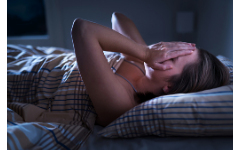Sleep is important for getting through the day. It helps you to think more clearly, to improve your overall mood, and to maintain a strong immune system 5. But there’s even more to it than that! Adequate sleep encourages the body to support a strong but sufficient appetite2, which translates into energy for bodily functions. Not enough sleep, however, may cause a person to feel very, very hungry.
How does proper sleep improve my diet quality?
The human body produces a hormone known as ghrelin, otherwise known as the “hunger hormone”. It communicates to your brain and body that you are hungry. Sleep plays an important role in how the hormone is released and because of that it affects appetite levels. When someone gets proper sleep, their ghrelin levels will be relatively normal. However, someone who is sleep deprived will have higher ghrelin levels, which makes it difficult for the person to know when their body has enough food. For this reason, sleep deprivation has the potential to cause someone to overeat.2,4
Why do I have trouble sleeping?
There are many reasons why someone may have difficulty sleeping. Research has found that the main reasons for poor sleep quality in adults include stress, tobacco use, family problems, and physical activity or work late at night. Additionally, the use of smartphones or other blue light screens can cause difficulty for the body to feel relaxed and sleepy.3,1,5
Suggestions for better sleep
Participants getting 7-9 hours of sleep were much more likely to have normal ghrelin levels, meaning that they were more likely to have a healthy, balanced appetite4. A great way to foster a healthy approach to sleep quality is to stay off of smartphones, tablets, and other blue light devices for an hour or more before bedtime. Try to make sure the room you sleep in is dark and quiet, too. This will help the body to gradually relax, and it will give you time to reflect on your day!

Citations
- Altun, Insaf, et al. “The Contributing Factors to Poor Sleep Experiences in According to the University Students: A Cross-Sectional Study.” Journal of Research in Medical Sciences : the Official Journal of Isfahan University of Medical Sciences, Medknow Publications & Media Pvt Ltd, June 2012, https://www.ncbi.nlm.nih.gov/pmc/articles/PMC3634295/.
- Greer, Stephanie M, et al. “The Impact of Sleep Deprivation on Food Desire in the Human Brain.” Nature Communications, U.S. National Library of Medicine, 2013, https://www.ncbi.nlm.nih.gov/pmc/articles/PMC3763921/.
- H;, Kumar VA;Chandrasekaran V;Brahadeeswari. “Prevalence of Smartphone Addiction and Its Effects on Sleep Quality: A Cross-Sectional Study among Medical Students.” Industrial Psychiatry Journal, U.S. National Library of Medicine, https://pubmed.ncbi.nlm.nih.gov/31879452/.
- “Sleep More to Eat Less: How Sleep Affects the ‘Hunger Hormone.’” Brigham Health Hub, 5 Nov. 2020, https://brighamhealthhub.org/controlling-the-hunger-hormone/#:~:text=Sleep%2Ddeprived%20adults%20tend%20to,sure%20to%20get%20enough%20sleep.
- “Sleep & Immunity: Can a Lack of Sleep Make You Sick?” Sleep Foundation, 19 Nov. 2020, https://www.sleepfoundation.org/physical-health/how-sleep-affects-immunity#:~:text=Sleep%20provides%20essential%20support%20to,and%20less%20severe%20allergic%20reactions.
- “Sleep.” The Nutrition Source, 14 Jan. 2022, https://www.hsph.harvard.edu/nutritionsource/sleep/.
This material is funded by UDSA’s supplemental Nutrition Assistance Program (SNAP).
This institution is an equal opportunity employer.
Written by Dietetics student Nick Copenhaver